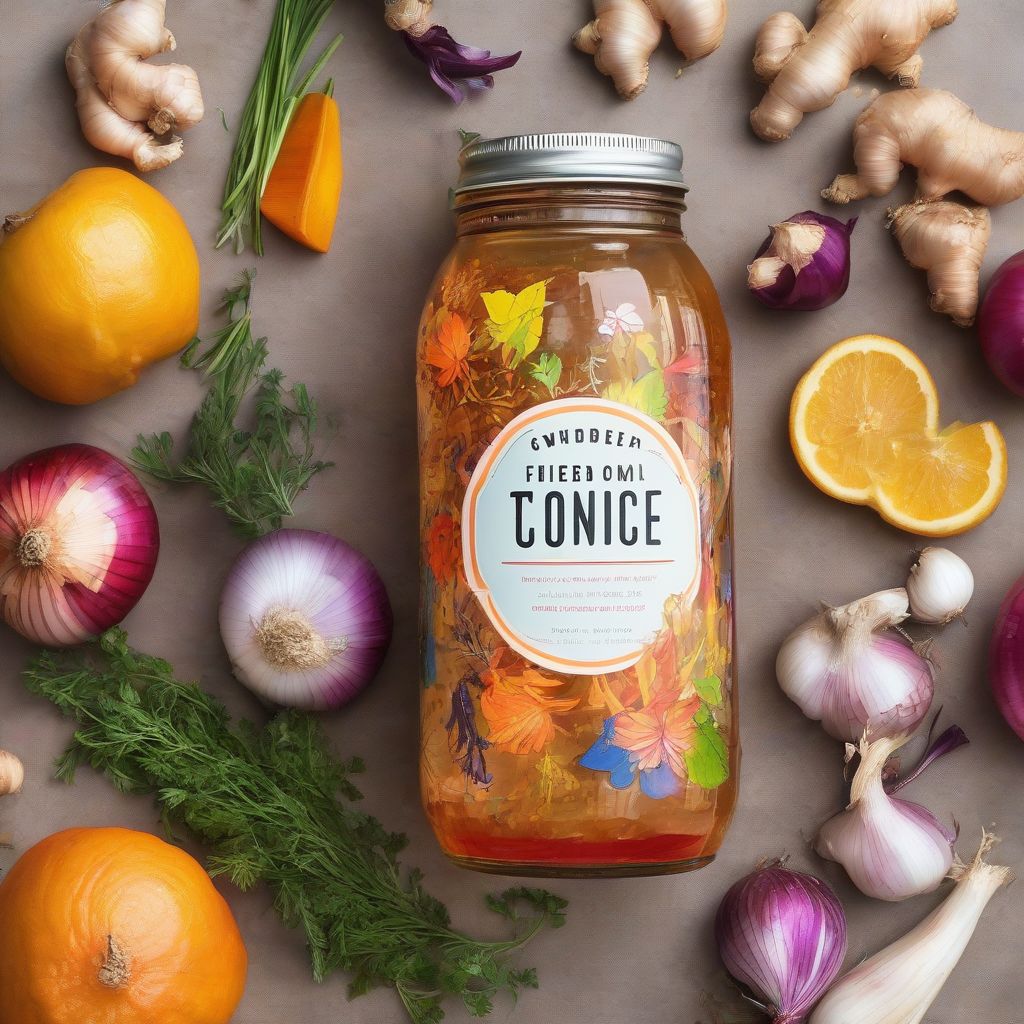Remember those whimsical apothecaries you see in movies, filled with mysterious jars and the scent of potent herbs? While modern life might seem a world away from that, there’s a growing movement towards reclaiming those ancient practices of natural wellness. And guess what? You don’t need a cauldron or a spellbook! Crafting your own herbal tonics and bitters can be a fun, empowering, and surprisingly easy way to take control of your health.
As a nutritionist and meal prep coach, I’ve seen firsthand how powerful natural remedies can be. Incorporating homemade herbal tonics and bitters into your routine can offer a wealth of benefits, from boosting digestion and supporting your immune system to simply adding a delicious, botanical twist to your drinks. Ready to unleash your inner herbalist? Let’s dive into the world of DIY tonics and bitters!
What are Herbal Tonics and Bitters, Anyway?
Before we start muddling and shaking, let’s clarify what we mean by herbal tonics and bitters.
- Herbal Tonics: Think of these as gentle, nourishing infusions designed to support your overall well-being over time. They’re typically made by steeping herbs, roots, fruits, or spices in water, alcohol (like vodka), or vinegar for several weeks. The result is a concentrated liquid packed with flavor and beneficial compounds.
- Bitters: As the name suggests, bitters are concentrated extracts known for their, well, bitter flavor. They’re made by infusing bitter herbs, roots, and barks in alcohol. While you wouldn’t sip them straight, a dash or two added to drinks or food stimulates digestion and can even curb sugar cravings.
Why You Should Try Making Your Own
- Freshness and Quality: You control exactly what goes into your tonics and bitters, ensuring the highest quality ingredients and avoiding unnecessary additives or preservatives.
- Customization: Tailor your creations to your specific taste preferences and health needs. Don’t like licorice root? Swap it out for something else!
- Cost-effective: Making your own herbal concoctions can be surprisingly budget-friendly, especially compared to buying pre-made versions.
- Connection to Nature: There’s something incredibly satisfying about working with plants and creating your own remedies. It’s a way to reconnect with nature and the healing power of herbs.
Getting Started: Essential Tools and Ingredients
Ready to unleash your inner herbalist? Here’s what you’ll need:
- Glass Jars: Choose jars with tight-fitting lids for storing your infusions.
- Cheesecloth or Fine-Mesh Strainer: For straining out the herbs.
- Dark Glass Bottles: For storing your finished tonics and bitters.
- High-Proof Alcohol (Optional): Vodka or grain alcohol work well for extracting the beneficial compounds from herbs. If you prefer to avoid alcohol, you can use glycerin or vinegar.
- Dried Herbs and Roots: The fun part! Get creative and experiment with different combinations. Some popular choices include:
- Digestive Support: Ginger, dandelion root, chamomile, fennel seeds
- Immune Boosting: Elderberry, echinacea, astragalus, turmeric
- Stress Relief: Ashwagandha, lemon balm, chamomile, holy basil
- Bitters: Gentian, dandelion root, orange peel, burdock root
The Best Recipes for Herbal Tonics and Bitters
Now for the exciting part: the recipes! These are just a starting point; feel free to get creative and experiment with different flavor combinations.
1. Digestive Fire Cider Tonic
 Fire Cider Tonic
Fire Cider Tonic
This spicy, tangy tonic is a powerhouse for promoting healthy digestion.
Ingredients:
- 1/2 cup grated fresh ginger
- 1/4 cup grated fresh turmeric
- 1/4 cup chopped garlic
- 1/4 cup chopped red onion
- 1 jalapeno pepper, chopped (optional)
- Zest and juice of 1 lemon
- 1/2 teaspoon black peppercorns
- Apple cider vinegar to cover
Instructions:
- Combine all ingredients in a jar and press down firmly to release juices.
- Top with apple cider vinegar, ensuring all ingredients are submerged.
- Seal the jar tightly and shake well.
- Store in a cool, dark place for 4-6 weeks, shaking occasionally.
- Strain through cheesecloth and store in a dark glass bottle.
- Take 1 tablespoon diluted in water before meals to aid digestion.
2. Immunity-Boosting Elderberry Tonic
This sweet and tart tonic is packed with antioxidants and immune-supportive properties.
Ingredients:
- 1 cup dried elderberries
- 1 inch fresh ginger, sliced
- 1 cinnamon stick
- 4 cloves
- 4 cups water
- 1 cup raw honey (optional)
Instructions:
- Combine elderberries, ginger, cinnamon, cloves, and water in a saucepan.
- Bring to a boil, then reduce heat and simmer for 45 minutes, or until the liquid has reduced by half.
- Strain the mixture through a fine-mesh strainer into a clean jar.
- Once cooled, stir in honey (if using) until dissolved.
- Store in a refrigerator for up to 2 weeks.
- Enjoy 1/4 cup daily for immune support.
3. Calming Nighttime Tonic
Unwind after a long day with this soothing blend of calming herbs.
Ingredients:
- 1 tablespoon dried chamomile flowers
- 1 tablespoon dried lavender flowers
- 1 tablespoon dried lemon balm
- 2 cups boiling water
- Honey or maple syrup to taste (optional)
Instructions:
- Combine herbs in a heat-proof container (like a teapot or French press).
- Pour boiling water over the herbs, cover, and steep for 10-15 minutes.
- Strain the tea into a mug and sweeten to taste, if desired.
- Sip slowly and enjoy before bed.
4. DIY Aromatic Bitters
Bitters are a great way to kickstart your digestion and add complex flavor to cocktails and mocktails.
Ingredients:
- 1/4 cup dried orange peel
- 1/4 cup gentian root
- 2 tablespoons dried dandelion root
- 1 tablespoon whole cardamom pods
- 1 teaspoon whole black peppercorns
- 1 cup high-proof vodka or grain alcohol
Instructions:
- Combine all ingredients in a jar and shake well.
- Store in a cool, dark place for 4-6 weeks, shaking occasionally.
- Strain through cheesecloth, squeezing out any excess liquid.
- Store in a dark glass bottle.
- Add a dash or two to cocktails, mocktails, soda water, or even plain water to aid digestion.
A Word of Caution
While herbs are generally safe, it’s essential to consult with your healthcare provider before incorporating them into your diet, especially if you have any underlying health conditions or are taking medications.
Embrace the Art of Herbal Wellness
Creating your own herbal tonics and bitters is a journey of discovery. As you experiment and find what works best for you, you’ll not only be crafting delicious elixirs but also cultivating a deeper connection to your health and well-being.
[amazon bestseller=”herbalism books”]
Ready to Take Your Herbal Adventures to the Next Level?
What are your favorite herbs to use in tonics and bitters? Share your recipes and experiences in the comments below!
